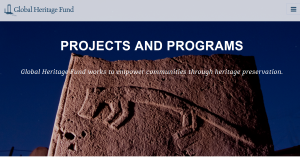 The academic study of heritage is experiencing an unexpected renaissance as, after decades of consignment to the ivory tower, ‘heritage’ has emerged as a favored buzzword, appearing in modern marketing for travel agencies, music festivals, and even celebrity food show, says the Global Heritage Fund (GHF), but what does the rise of ‘heritage’ mean for the future of conservation?
The academic study of heritage is experiencing an unexpected renaissance as, after decades of consignment to the ivory tower, ‘heritage’ has emerged as a favored buzzword, appearing in modern marketing for travel agencies, music festivals, and even celebrity food show, says the Global Heritage Fund (GHF), but what does the rise of ‘heritage’ mean for the future of conservation?
Global Heritage Fund writes:
‘Heritage’ has suddenly become internationally hip. From Bangkok to Paris, Cape Town to Cork, the term ‘heritage’ adorns marketing materials in a huge range of industries. This year, Europe celebrates the European Year of Cultural Heritage, underscoring a sense of shared history. International bodies, such as UNESCO, declare that we all possess a common cultural heritage, officially encompassing such disparate elements as the art of boatbuilding in South Sulawesi, the traditional horse games of Kyrgyzstan, and the performative poetry of the UAE.
Meanwhile, researchers throughout the world speculate that growing interest in DNA testing will ignite the trend of heritage tourism among millennials. Even the culinary world is joining the action, including celebrity chef and esteemed traveler Anthony Bourdain, who waxed poetic about the authenticity of street food, lauded traditional culinary techniques, and familiarized viewers with terminology previously limited to the realm of academia.
Professionals in the heritage field—the conservators, historians, site managers, researchers, and many others—have reacted to these unexpected developments in a variety of ways. After decades of being ignored, many within heritage were caught flat-footed by the cultural shift toward not only recognizing heritage but actively promoting it. On the other hand, a wide swath of heritage practitioners is cautiously optimistic about the new trend, happy for the increased attention paid to historic and cultural sites but mindful of the potential costs.
These developments beg the question: should heritage professionals celebrate the public’s surge in interest toward heritage, history and tradition? The short answer? Not necessarily. The slighter longer answer? It’s complicated.
